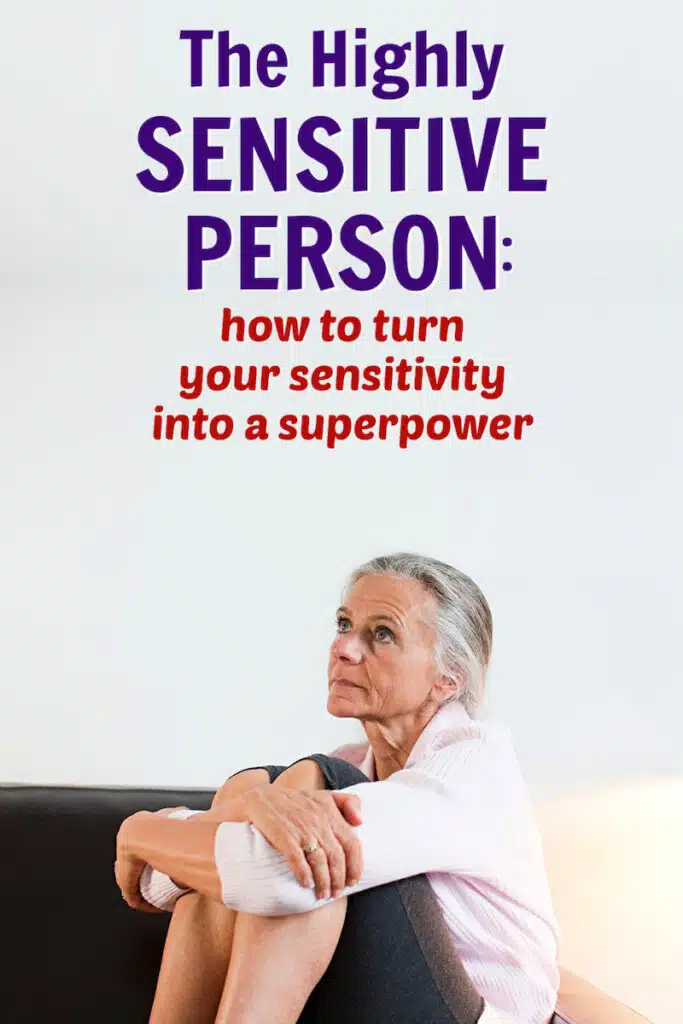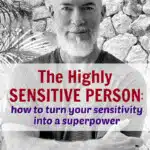Highly Sensitive Persons (HSPs) possess unique qualities that can be leveraged to their own advantage – and to the benefit of the world at large.
Because the modern world tends to value extroversion and bluster, sensitivity is sometimes mistakenly viewed as a weakness. But the truth is, sensitivity can be a type of rare human superpower – especially when understood and nurtured.
You can unlock the power of sensitivity. Here’s how to tap into your intuition for inner strength, personal growth, and fulfillment.
Below, I share what it means to be a highly sensitive person and how you can harness sensitivity to flourish in life.
Brain-Style: Sensitivity Differences within the Population
Brain diversity means that each person has different neurological wiring – and different styles of processing information.
- Take a moment to imagine a person who has a biological central nervous system that is 15% more finely tuned than average.
- Imagine putting that person in a room with someone 15% less sensitive than the average human.
- Confusion often ensues.
To a highly sensitive person, having to share space with someone who blusters into the room without taking the energetic temperature can be frustrating. To the sensitive person, the less-sensitive person seems oblivious.
To the less-sensitive-than-average person, sharing space with a highly sensitive person can be similarly baffling. They just don’t get what the issue is. To the less sensitive, the highly sensitive person seems unnecessarily complex.
Provided we can all be more patient with one another, this brain diversity is a good thing.
Brain-style differences make the world more interesting and its problems more solvable (because different problems require different skill sets).
What Are the Signs of High Sensitivity?
Do you know a highly sensitive person?
Highly sensitive persons (HSPs) exhibit certain traits that differentiate them from the general population.
Are you a highly sensitive person?
Signs of sensitivity can vary in intensity and expression from person to person. Still, there are some commonalities:
Heightened Sensory Perception: HSPs tend to have heightened sensitivity to sensory stimuli.
- Do you notice that you’re more aware of subtle sounds, textures, bright lights, or strong smells?
- Are you affected by loud or chaotic environments and usually prefer calmer and more peaceful surroundings?

When I was a young child, I started removing the tags from the back of my shirt collars because I could feel them touching my neck and was irked.
I would feel drained when I went to shopping centers and got exposed to the blue-white glare of the fluorescent overhead lighting with its accompanying electrical buzz/hum.
Also, I was confused by school cafeterias. I found them overstimulating. They were loud and filled with clashing smells. Kids squished in on either side of me on the benches eating their hot lunches while laughing, yelling, and burping. I’d lose my appetite.
This was an earlier era when most people were assumed to be the same, and no one would have thought to notice that I had a highly sensitive central nervous system, let alone explain it to me so that I might understand that it was a good thing.
As an adult, I realized that most kids didn’t notice the competing smells of corn, grease, and sweat. To many kids, the loudness was fun and exciting.
Leverage Your Sensitivity Superpower: An HSP Guide to Personal Growth and Fulfillment
Here are some more ways to identify a potential gift of sensitivity and a heightened central nervous system.
Emotional Responsiveness: HSPs often experience emotions more deeply and intensely.
- Do you easily pick up on others’ emotions? You might even be prone to emotional contagion, absorbing the emotional atmosphere around you.
Overstimulation and Sensory Overload: HSPs can become easily overwhelmed by excessive sensory input or too much stimulation.
- Do you feel exhausted after being in busy environments for an extended period?
- Do you then require time alone in quiet settings to restore your energy?
Perceptive and Detail-Oriented: HSPs notice subtle details that others may miss.
- Do you have a keen eye for aesthetics, noticing nuances in your environment?
- Do you appreciate art, music, or nature on a deep level?
Empathy and Compassion: HSPs have a natural ability to empathize and attune with others.

Intuitive and Insightful: Highly sensitive persons often possess intuition.
- Do you tend to pick up on nonverbal cues and underlying meanings in situations?
- Do you have a sense of knowing that guides your decisions and actions?
Need for Meaning and Depth: Highly sensitive persons often seek meaning and purpose.
- Do you find that you can be introspective?
- Do you self-reflect, pondering the philosophical or existential questions?
- Do you believe you tend to value deeper connections and meaningful relationships, emphasizing quality over quantity?
Times have changed. Brain-style differences are now more acknowledged and valued.
Being highly sensitive comes with numerous positive attributes that, when embraced, can empower individuals to excel in various domains.
I see sensitivity as a form of giftedness and a cause for celebration:
- Suppose you’re the parent of a Highly Sensitive Person. In that case, it can be a relief to understand that your offspring has a specific personality and will be organically pulled to a specific path in life. You can finally accept – perhaps even embrace – the fact that, yes, your child is different.
- If you are the highly sensitive one, you can finally be confident that your brain style has its strengths and can be viewed as a unique characteristic – in a good way. Embracing and understanding your sensitivity can lead to personal growth, self-acceptance, and finding strategies to thrive (in a world that may not always be attuned to the needs of highly sensitive individuals).
Is Being a HSP a Personality Disorder?
No, being a highly sensitive person (HSP) is not a personality disorder. It’s simply a personality trait or temperament present in a certain percentage of the population.

Being highly sensitive is not considered a mental health disorder or a pathological condition.
Personality disorders are characterized by:
- Enduring patterns of maladaptive thoughts, behaviors, and emotional reactions that significantly impair an individual’s functioning and well-being.
- Borderline personality disorder (habitual anger) and narcissistic personality disorder (habitual self-absorption) involve persistent and inflexible traits that cause distress and difficulties in various areas of life.
Is HSP on the Autism Spectrum?
High sensitivity is a normal variation of temperament and is not inherently pathological or problematic.
Being a highly sensitive person (HSP) is not synonymous with being on the autism spectrum.
While there may be some overlap in certain traits or sensitivities, HSP and autism are distinct concepts.
High sensitivity refers to a temperament or personality trait characterized by heightened sensitivity to various stimuli, such as sensory input, emotions, and environmental factors.
Highly sensitive individuals may have a more reactive nervous system and experience sensory overload or emotional overwhelm more easily than others. However, high sensitivity is not a diagnostic criterion for autism.
Autism, or autism spectrum disorder (ASD), is a neurodevelopmental condition that affects social interaction, communication, and behavior. It is characterized by difficulties in social communication, repetitive behaviors, restricted interests, and sensory sensitivities, among other features.
While individuals on the autism spectrum may exhibit sensory sensitivities, these sensitivities are just one aspect of the broader range of symptoms associated with autism.
The Dysregulated Nervous System – a Danger for HSP
A dysregulated nervous system is a state in which the biological central nervous system (CNS) is not functioning optimally or is out of balance.
The central nervous system includes the brain and spinal cord and is vital in coordinating bodily functions – including sensory perception, motor control, emotional responses, and stress regulation.
When the nervous system is dysregulated, its ability to effectively respond to and adapt to internal and external stimuli is compromised.
A dysregulated nervous system can significantly impact highly sensitive persons (HSPs) due to their heightened sensitivity to external stimuli.
HSPs already possess a more finely tuned nervous system, making them more susceptible to overstimulation.
These challenges can be further amplified when combined with a dysregulated nervous system.
Key ways in which a dysregulated nervous system can relate to highly sensitive persons are sensory overwhelm, emotional dysregulation, increased stress sensitivity, difficulties with boundaries, and sleep disturbances.
One possible indicator that your nervous system is dysregulated is hypervigilance.
Hypervigilance is a state of heightened awareness and attention to potential environmental threats or dangers. It’s often associated with anxiety and post-traumatic stress disorder (PTSD).
People experiencing hypervigilance tend to be constantly on guard, anticipating potential dangers and scanning their surroundings for signs of threat – either consciously or unconsciously. They tend to know who in the room is happy and who is frustrated. It’s a lot to take in.
For example, one clue that my nervous system is becoming dysregulated is when my startle response reaches a strangely low threshold. Like, the smallest unexpected noise makes me jump and tense up.
It’s important for highly sensitive persons to recognize the interaction between their sensitivity and a dysregulated nervous system.
Developing strategies for self-care, stress management, and sensory regulation becomes crucial in managing these challenges.
Practices such as establishing boundaries, engaging in relaxation techniques, practicing mindfulness, seeking therapy or counseling, and creating supportive environments can regulate the nervous system and support the well-being of highly sensitive persons. Personally, I find yoga and breathing exercises to be especially helpful.
By focusing on self-awareness and self-care, highly sensitive persons can navigate the world with more ease.
Do Highly Sensitive Persons Have More Empathy?
Yes, highly sensitive persons (HSPs) often have a heightened capacity for empathy.
One of the remarkable strengths of highly sensitive persons is their ability to empathize deeply with others.
HSPs possess a unique capacity to understand and connect with the emotions of those around them.
By acknowledging and embracing this inherent gift, they can become compassionate leaders, effective communicators, and skilled negotiators.
Thriving as a Highly Sensitive Person: Tips & Strategies
To make sensitivity a superpower, HSPs must cultivate objective self-awareness and emotional intelligence.
By recognizing and understanding their own emotions, they can navigate social interactions with greater ease and provide genuine support to others.
Again, individual or group therapy is excellent for this. But also, meditation can be surprisingly effective in that it teaches you to observe your own thoughts objectively.
The idea with meditation is to “watch the watcher,” with suspended judgement.
It’s as if you observe each of your thoughts floating by on a barge as they pass down a lazy, slow river. “Oh, that’s an anxious thought. Oh, that’s a memory from the past. Oh, that’s me fantasizing about the future. Oh, that thought is fear-based. Oh, that thought is hopeful.”
And after each thought, you gently guide your awareness back to the sound and physical sensation of your own breath and lungs.
Harnessing their empathic nature allows HSPs to foster strong relationships, resolve conflicts, and positively impact the lives of those they encounter.
Unleash Your HSP Superpower: Thrive in a Loud World by Creating Optimal Environments
Highly sensitive persons are acutely affected by their surroundings, including physical spaces, noise levels, and the energy of people around them.
To leverage sensitivity effectively, HSPs need to create environments that foster their contentment and productivity.
This can involve creating a calm and organized workspace, setting boundaries to manage external stimuli, and incorporating relaxation techniques. HSPs can maximize their productivity, creativity, and overall satisfaction by tailoring their environment to suit their unique needs.
For a lot of HSPs, their homes look like tranquil oases. Mine certainly does. My friends have even taken to teasingly referring to our house as “Spa Dane.”
Persons With High Sensitivity Can Capitalize on Intuition
Intuition is a powerful asset for highly sensitive persons.
HSPs often possess a finely tuned internal compass that enables them to perceive subtle cues and insights that others may miss.
By trusting their intuition, HSPs can make well-informed decisions in personal relationships or professional endeavors.
To harness the power of intuition, HSPs can practice making choices aligned with their authentic selves.
An easy way to do this is to get very matter-of-fact about what brings you joy and what doesn’t.
Use diplomacy when with others, but with yourself, strive always to be brutally honest about what you genuinely like and what you don’t like.
Self-Care and Emotional Well-being for the HSP
Given their heightened sensitivity, self-care is paramount for HSPs.
Engaging in activities that replenish and rejuvenate your energy is essential to maintain a balanced emotional state.
Self-care practices can include regular exercise, quality sleep, nurturing healthy social connections, an anti-inflammatory diet, and engaging in hobbies or creative outlets.
In particular, I find it helpful to fine-tune my morning routine and before-bed routine. The activities and thoughts you have upon waking and before going to sleep seem to be especially pivotal.
Managing overstimulation is also crucial for HSPs to maintain their well-being.
You’ll likely benefit from setting boundaries, practicing stress-management techniques, and carving out time for solitude and introspection.
By prioritizing self-care, highly sensitive persons can strengthen their resilience and prevent burnout.
Highly Sensitive Persons Can Embrace Opportunities for Growth
Although highly sensitive persons may face unique challenges, it’s vital for them to view their sensitivity as a strength rather than a limitation.
By reframing their experiences, HSPs can embrace personal and professional growth opportunities.
Seeking guidance from mentors can provide valuable encouragement and perspective along the journey.
It’s important for highly sensitive persons to recognize that their sensitivity allows them to perceive and appreciate subtleties that others may overlook.
This heightened awareness can be channeled into creative pursuits such as art, music, writing, or entrepreneurship.
By leveraging their unique perspective, HSPs can offer innovative solutions and make significant contributions in their respective fields.
Developing effective communication, assertiveness, and self-advocacy skills can help HSPs navigate professional environments and overcome any perceived limitations.
Finding Balance and Self-Acceptance of Sensitivity
While sensitivity can be a superpower, highly sensitive persons need to find a balance between embracing their sensitivity and practicing self-acceptance.
Understanding that sensitivity is a core aspect of their being, not something that needs fixing, is crucial for their well-being:
- Highly sensitive persons encounter societal pressure to conform to extroverted ideals or suppress emotions!
- However, by embracing their authenticity and celebrating their unique traits, HSPs can create a fulfilling and meaningful life.
Surrounding yourself with supportive individuals who appreciate and value your sensitivity can significantly foster self-acceptance.
It’s worth noting that some highly sensitive individuals may experience mental health conditions or challenges, such as anxiety or depression, as their sensitivity can make them more susceptible to stress. In such cases, seeking appropriate support from mental health professionals is wise.
Conclusion: Are You a Highly Sensitive Person?
Tap into a superpower you didn’t even know you had!
Thrive in life more than you ever thought possible!
Being a highly sensitive person is a gift that, when harnessed effectively, can transform sensitivity into a superpower.
As a highly sensitive person, you can flourish by understanding your needs, embracing your empathy and intuition, creating optimal environments, and prioritizing your self-care.
I encourage you to recognize your inherent strengths and reframe your experiences through a positive lens!
By embracing personal growth opportunities, finding balance, and practicing self-acceptance, highly sensitive persons can lead extremely fulfilling lives and significantly impact the world in a positive way.
Remember, sensitivity is not a weakness but a unique quality that can be transformed into a superpower when nurtured with care and self-awareness. So, embrace your sensitivity and let it shine as your superpower.
Additional Resources and Recommend Reading for HSPs (and those who love them):
Dr. Judith Orloff and Life Strategies for Highly Sensitive Persons – https://drjudithorloff.com/quizzes/are-you-an-empath-20-question-self-assessment-test/
Dr. Robin Berman on Parenting with Love and Limits – http://permissiontoparent.net/home
Individual Differences in Adult Human Brain Structure – https://www.ncbi.nlm.nih.gov/pmc/articles/PMC4009419/
